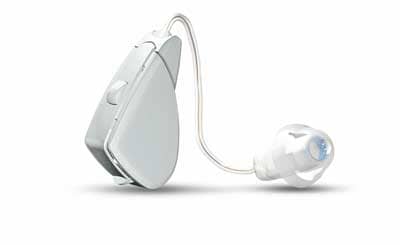“Our results suggest that tinnitus will likely get louder, but not by very much,” write Hashir Aazh, PhD, and Richard Salvi, PhD, in their recent study published in JAAA which shows only a weak association between tinnitus loudness and puretone average (PTA) thresholds.
When patients ask an audiologist or hearing care professional if their tinnitus (ringing in the ears) is going to get worse as their hearing loss progresses, what answer do they usually receive? Most hearing care professionals will reassure the patient by telling them that, although it’s possible for this to occur, it’s generally not a problem they’ve observed in their practice. Now there is some clinical science to back up this answer.
A paper published in the September 2019 edition of the Journal of the American Academy of Audiology by Hashir Aazh, PhD, and Richard Salvi, PhD, shows that the relationship between tinnitus loudness and puretone average (PTA) thresholds are only weakly associated.
The researchers looked at a retrospective cross-sectional sample of 445 consecutive patients at the Tinnitus and Hyperacusis Therapy Specialist Clinic in Guildford, UK, who had been surveyed with audiological and self-report questionnaires. The patients were seen from 2013 to 2016 and had an average age of 54.4 years, with an even split between males (49%) and females (51%). Questionnaires included the visual analog scale (VAS), tinnitus handicap inventory (THI), hyperacusis questionnaire (HQ), hospital anxiety and depression scale (HADS), and the insomnia severity index (ISI).
In the sample, a total of 12% of patients had no tinnitus handicap on the THI, while 32% had mild, 24% had moderate, and 33% had severe tinnitus handicap. Based on PTA for the better ear, 66% of the tinnitus patients had no hearing loss, 29% had mild hearing loss, and 5% had moderate hearing loss. For the worse ear, 49% of patients had no hearing loss, 36% had a mild loss, 13% had a moderate loss, while 0.6% and 0.9% had a severe and profound hearing loss respectively.
When analyzing tinnitus severity and hearing loss via a regression model, a .036 increase in loudness per 1-dB increase in PTA threshold was found at a significant level of confidence. “This relationship is very weak and the linear model explains only 4% of the variance in tinnitus loudness, suggesting that factors other than severity of hearing loss may contribute to self-report tinnitus loudness,” write the authors.
However, correlations were noted between tinnitus severity and the other variables measured in the questionnaires. These included:
- Based on the HQ score, 32% experienced hyperacusis (unusual sensitivity/aversion to louder sounds) with 4% being diagnosed with severe hyperacusis.
- While 31% did not have insomnia, 29.5% had mild insomnia, while 27.5% and 12% had moderate or severe insomnia respectively.
- Tinnitus loudness was more strongly correlated with tinnitus annoyance and tinnitus life effect than PTA.
The authors hypothesize that the weak association between PTA and tinnitus severity could be explained by an increase in spontaneous activity within the central nervous system (CNS) after cochlear damage, as cited in other studies. However, the authors also note the weak correlation “may be due to the fact that threshold measures do not accurately capture some forms of cochlear pathology that may trigger tinnitus.” For example, it’s possible that some forms of tinnitus might arise from damaged inner hair cells or afferent synapses, but these types of cochlear damage are often not reflected in an audiogram (eg, cochlear synaptopathy or “hidden hearing loss”).
Drs Aazh and Salvi conclude, “Tinnitus patients often ask whether the loudness of their tinnitus will increase if their hearing gets worse. Our results suggest that tinnitus will likely get louder, but not by very much.” They note that the study was limited to information gathered in day-to-day clinics and did not include psychoacoustic measures of tinnitus loudness which might be useful in further research.
Dr Aazh is head of the Tinnitus and Hyperacusis Therapy Specialist Clinic at the Royal Surrey County Hospital NHS Foundation Trust in Guildford, UK. Dr Salvi is the co-founder and director of the Center for Hearing and Deafness at the University of Buffalo. —KES
Original paper: Aazh H, Salvi R. The relationship between severity of hearing loss and subjective tinnitus loudness among patients seen in a specialist tinnitus and hyperacusis therapy clinic in UK. J Am Acad Audiol. 2019;30(8)[Sept]:712-719.
About the author: Karl E. Strom is editor of The Hearing Review and has been reporting on hearing healthcare issues for over 25 years.
Acknowledgement: Thanks to Dr Aazh for images and use of the video.







